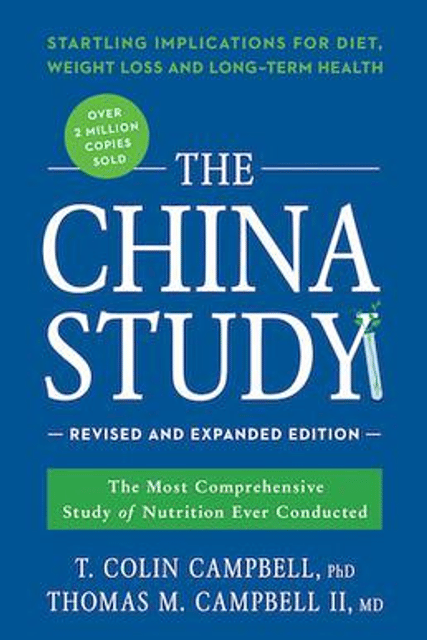The China Study

The China Study

| Author | T. Colin Campbell, Ph.D. and Thomas M. Campbell II, M.D. |
|---|---|
| Country | United States |
| Subject | Nutritional science |
| Publisher | BenBella Books |
| January 2005[1] | |
| Pages | 417 (first edition) |
| ISBN | 1-932100-38-5 |
| Followed by | Whole: Rethinking the Science of Nutrition (2013) |
The China Study examines the link between the consumption of animal products (including dairy) and chronic illnesses such as coronary heart disease, diabetes, breast cancer, prostate cancer, and bowel cancer.[7] The authors conclude that people who eat a predominantly whole-food, plant-based diet—avoiding animal products as a main source of nutrition, including beef, pork, poultry, fish, eggs, cheese, and milk, and reducing their intake of processed foods and refined carbohydrates—will escape, reduce, or reverse the development of numerous diseases. They write that "eating foods that contain any cholesterol above 0 mg is unhealthy".[8]
The book recommends sunshine exposure or dietary supplements to maintain adequate levels of vitamin D, and supplements of vitamin B12 in case of complete avoidance of animal products.[9] It criticizes low-carb diets, such as the Atkins diet, which include restrictions on the percentage of calories derived from carbohydrates[10] The authors are critical of reductionist approaches to the study of nutrition, whereby certain nutrients are blamed for disease, as opposed to studying patterns of nutrition and the interactions between nutrients.[11]
The book is based on the China–Cornell–Oxford Project, a 20-year study—described by The New York Times as "the Grand Prix of epidemiology"—conducted by the Chinese Academy of Preventive Medicine, Cornell University, and the University of Oxford. T. Colin Campbell was one of the study's directors.[2][13][14] It looked at mortality rates from cancer and other chronic diseases from 1973–75 in 65 counties in China; the data was correlated with 1983–84 dietary surveys and blood work from 100 people in each county. The research was conducted in those counties because they had genetically similar populations that tended, over generations, to live and eat in the same way in the same place. The study concluded that counties with a high consumption of animal-based foods in 1983–84 were more likely to have had higher death rates from "Western" diseases as of 1973–75, while the opposite was true for counties that ate more plant-based foods.[15]
| Author | T. Colin Campbell, Ph.D. and Thomas M. Campbell II, M.D. |
|---|---|
| Country | United States |
| Subject | Nutritional science |
| Publisher | BenBella Books |
| January 2005[1] | |
| Pages | 417 (first edition) |
| ISBN | 1-932100-38-5 |
| Followed by | Whole: Rethinking the Science of Nutrition (2013) |
Background to the China–Cornell–Oxford Project
The China–Cornell–Oxford Project—the "China-Oxford-Cornell Study on Dietary, Lifestyle and Disease Mortality Characteristics in 65 Rural Chinese Counties," referred to in the book as "the China Study"—was a comprehensive study of dietary and lifestyle factors associated with disease mortality in China.
The study compared the health consequences of diets rich in animal-based foods to diets rich in plant-based foods among people who were genetically similar.[13]
The idea for the study began in 1980–81 during discussions between T. Colin Campbell at Cornell and Chen Junshi, Deputy Director of Institute of Nutrition and Food Hygiene at the Chinese Academy of Preventive Medicine.
They were later joined by Richard Peto of the University of Oxford—Professor of Medical Statistics and Epidemiology as of 2012—and Li Junyao of the China Cancer Institute.[15]
In 1983 two villages were chosen at random in each of 65 rural counties in China, and 50 families were chosen at random in each village.
The dietary habits of one adult member of each family were examined—half male, half female—and the results compared to the death rates in those counties from around 48 forms of cancers and other diseases during 1973–75.[15]
Reception
Sanjay Gupta, CNN's chief medical correspondent, said in his documentary The Last Heart Attack in 2011 that The China Study had changed the way people all over the world eat.[17] Former American President Bill Clinton became a supporter when he adopted a plant-based diet after a heart attack.[18][3]
Wilfred Niels Arnold, professor of biochemistry at the University of Kansas Medical Center, reviewed the book in Leonardo in 2005: "[T]he authors anticipate resistant and hostile sources, sail on with escalating enthusiasm, and furnish a working hypothesis that is valuable. In fact, the surprising data are difficult to interpret in any other way."[24]
In a written debate with Campbell in 2008, nutritionist Loren Cordain argued that "the fundamental logic underlying Campbell's hypothesis (that low [animal] protein diets improve human health) is untenable and inconsistent with the evolution of our own species." Campbell argued that "diet–disease associations observed in contemporary times are far more meaningful than what might have occurred during evolutionary times—at least since the last 2.5 million years or so.".[25]
The book was reviewed by Harriet Hall, a physician and skeptic who writes about alternative medicine, in a blog entry[26] posted on the Science-Based Medicine website in 2009. Hall argued that the book had references which do not support directly the claims made by the authors. She also stated that the book does not explain the exceptions to his data—for example that "stomach cancer rates are higher in China than elsewhere in the world".[27]
See also
Stanley Green
Adventist Health Studies